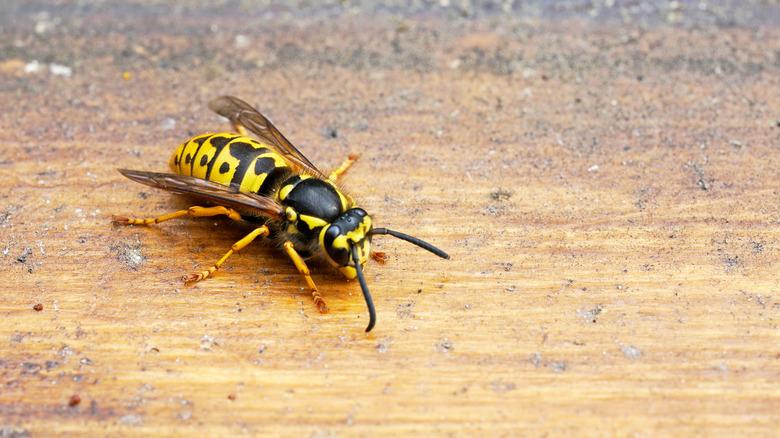The Real Difference Between A Wasp And A Bee Sting
Wasps and bees are commonly confused — though closely related they are, in fact, different kinds of insects (via BBC). Wasps are carnivores and kill their prey with their stingers. They then lay eggs inside their prey. Bees, on the other hand, feed on nectar and pollen and make honey in complex hives made of wax.
One of the biggest differences between wasps and bees is how they sting. Since wasps use their stingers to kill their prey, they can sting more than once. Note that humans are not wasp prey, but wasps may still sting if they feel threatened (though they do not lay eggs in human skin). "If a wasp is near or on you, and you panic and try to swat it away, it's going to interpret that as an aggressive act," Howard Russell, an epidemiologist at Michigan State University, told Prevention. But if you calmly brush a wasp away from you and walk away, it should leave you alone. In contrast, when bees sting humans, their stingers break off and become embedded in the skin. This kills the bee. Bees also do not typically sting humans unless they feel attacked.
Treating a bee or wasp sting
A bee or wasp sting can be painful and may lead to swelling, redness, and itchiness, but these symptoms typically go away within a few days (via MedicalNewsToday). An over-the-counter pain reliever like aspirin or acetaminophen can be used to relieve pain, and antihistamine creams or oral tablets can help ease swelling. Some stings may lead to a large local reaction and cause extreme redness and swelling. Multiple stings can lead to a rash, nausea, headache, and fever, and can even be fatal for children.
Some people are allergic to bees, and a bee sting can cause a severe allergic reaction. If not treated, anaphylactic shock can occur quickly and lead to death. Symptoms of anaphylaxis include wheezing, difficulty breathing, severe swelling of the face, throat, or lips, dizziness, fast heart rate, hives, nausea, vomiting, diarrhea, sudden drop in blood pressure, difficulty swallowing, confusion, and agitation. If anyone experiences these symptoms after a sting, they should be brought to the emergency room right away. Individuals who know they are allergic to bees or wasps should carry an EpiPen or other epinephrine shot. This will help the body deal with the reaction until medical treatment is received.

